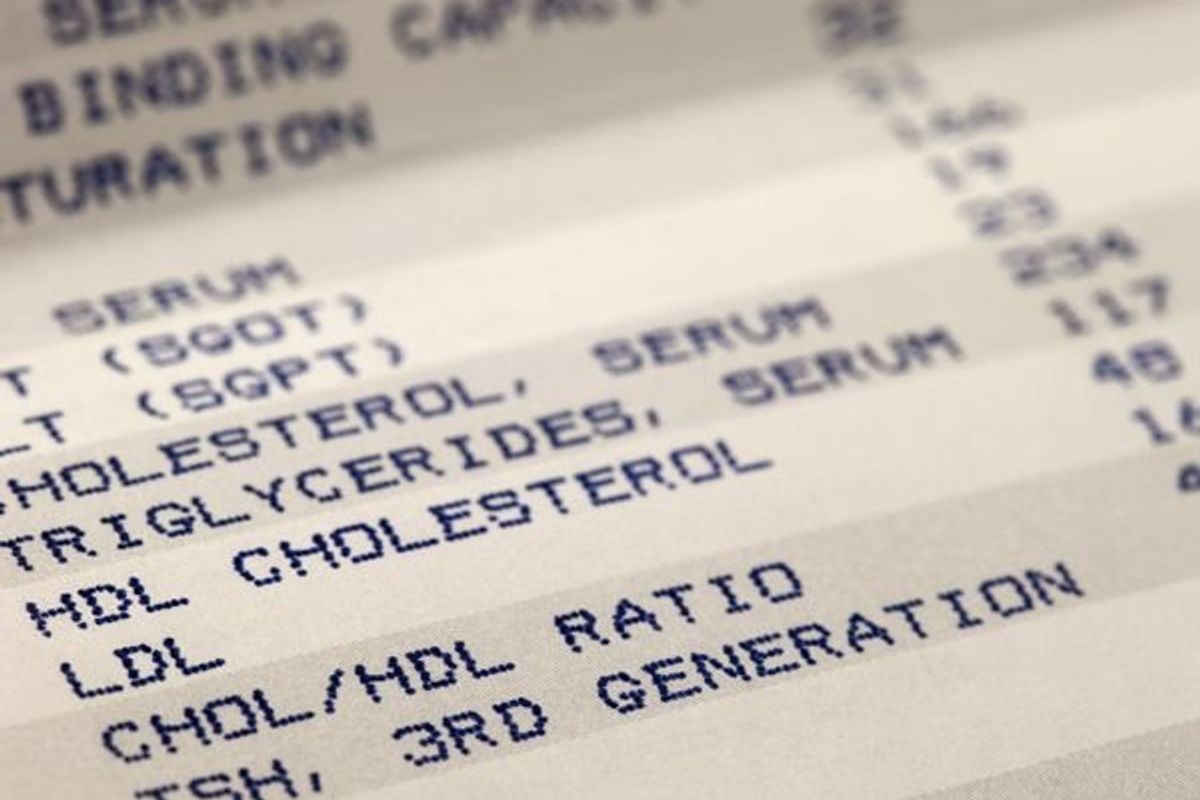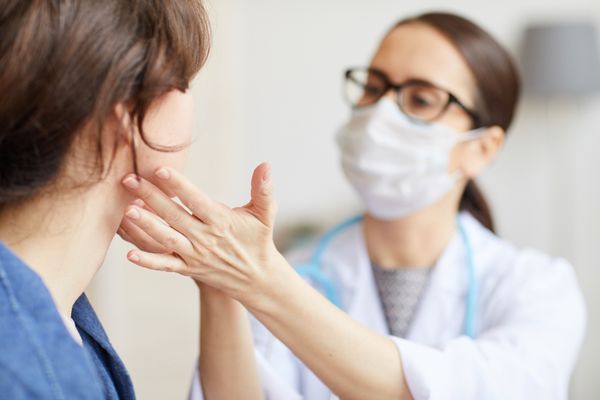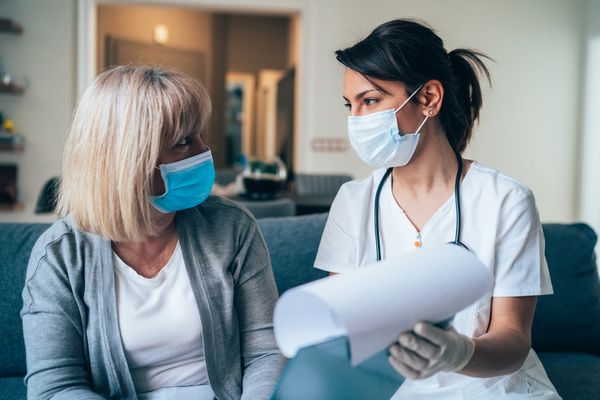Because you're at greater risk for medical problems as you age, your health care routine should include more frequent preventive tests and screenings. This is especially true if you are at high risk or have a family history of medical problems, or you have serious medical conditions. You should have a routine physical and gynecological exam yearly. In addition, these guidelines are recommended for healthy women in their 60s. If you have health problems, be sure to get the specialized care and additional tests prescribed by your health care professional.
Blood pressure test for hypertension: Have your blood pressure taken at least every two years if normal, more often if it is at or above 120/80.
Bone mineral density exam/bone mass measurement: Recommended for women who have sustained a fracture, are at increased risk due to certain medications and for patients with diseases or conditions that are known to be associated with bone loss. Once you reach age 65, you should be screened regardless of risk factors, and follow-up scans should be performed about every one to two years. The test is an X-ray and is not painful.
Breast self-exam: Some health care professionals suggest doing a breast self-examination each month. However, research has shown that BSE plays a small role in finding breast cancer compared with finding a breast lump by chance or simply knowing what is normal. If you choose to perform a monthly BSE, ask your health care professional to show you how to perform one.
Cholesterol: Have your blood cholesterol tested every five years or more frequently if you have risk factors for heart disease.
Clinical breast exam: Talk with your health care professional about getting this exam. Screening recommendations vary on whether this is beneficial in combination with a mammogram, so talk with your health care provider about whether it's right for you. If so, your doctor or other health care professional will examine your breasts for any abnormalities, often as part of the annual gynecologic examination.
Colorectal cancer screening: You should be screened for colorectal cancer using any of several different screening methods. There are a number of tests that screen for colorectal cancer, and they are divided into two groups: tests that find both colorectal cancer and polyps, and those that mainly find cancer. The American Cancer Society recommends that women at average risk of colorectal cancer have one of the following screening tests beginning at age 50:
Tests that find polyps and cancer:
- Colonoscopy every 10 years
- Flexible sigmoidoscopy every five years
- CT colonography (virtual colonoscopy) every five years
- Double contrast barium enema every five years
(If any of the above tests are positive, a colonoscopy should be done.)
Tests that mainly find cancer:
- Fecal occult blood test (FOBT) every year
- Fecal immunochemical test (FIT) every year
- Stool DNA (sDNA), interval uncertain
Discuss options and procedures with your health care professional to determine the best screening method for you.
Dental exam: Visit the dentist regularly. Check-ups can detect early signs of oral health problems and bone loss. Professional tooth cleaning is also important for preventing oral problems and should be done every six to 12 months.
Diabetes blood sugar test: You should be screened every three years; more often or earlier if you're overweight or have other risks for diabetes.
Eye exam: The American Academy of Opthalmology now recommends that starting at age 40, adults with no risk factors or signs of eye disease get a baseline screening. Then based on the results of that initial screening, an ophthalmologist will prescribe the necessary follow-up exams. At age 65 and older, you should be examined every one to two years to check for cataracts, glaucoma, age-related macular degeneration, diabetic retinopathy and other eye conditions. Exception: If you have vision problems, family history of eye problems, history of an eye injury or have diabetes, you should be seen more frequently by an eye care specialist.
Mammography: You should be screened for breast cancer with mammography every one to two years. Guidelines on breast cancer screening vary, so talk to your health care professional about what's right for you.
Pap test and pelvic exam: Continue getting a Pap test every three years or both a Pap test and an HPV test every five years. If you've been screened and had normal results and are not at high risk for cervical cancer, you may stop getting screened after age 65. Exception: If you have risk factors such as cervical precancer, multiple sex partners, a weakened immune system or HIV infection, you should have a Pap test every year.
If you have had a total hysterectomy (removal of both your uterus and cervix), you may stop having cervical cancer screenings, unless the surgery was done as a treatment for cervical cancer or precancer. If you had a hysterectomy without removal of your cervix, you should continue to follow the guidelines above.
Remember: Don't confuse your annual or semi-annual Pap test with a gynecologic examination. The American College of Obstetricians and Gynecologists (ACOG) recommends that all women your age have a gynecologic examination, including a pelvic exam, annually.
Sexually transmitted diseases: If you have a history of Chlamydia or other sexually transmitted diseases (STDs), or you or your partner have had multiple sex partners, ask your health care professional about whether you need to be screened for STDs, including gonorrhea and HIV.
Skin exam for skin cancer: The American Academy of Dermatology recommends that you have your skin examined every year. Recommendations include doing a monthly mole self-exam and practicing sun safety to reduce your risk of damaging your skin and developing skin cancer. If you have had skin cancer or have a relative with a history of melanoma, ask your health care professional for guidance.
Thyroid test (TSH): Recommendations vary. The American Thyroid Association recommends having a TSH screening test at age 35 and then once every five years. The American Academy of Family Physicians does not recommend screening patients before age 60. And the U.S. Preventive Services Task Force states that there's not enough evidence to recommend for or against thyroid screening in adults. Ask your health care professional for guidance.
Weight: Obesity screening is now considered a preventive checkup. Ask your health care professional for more information on healthy weight guidelines or weight-management strategies.
Immunizations:
Hepatitis A: This vaccine is recommended for adults who live, work or travel in areas where hepatitis A is endemic and periodic outbreaks occur, or users of injection or street drugs, military personnel, institutionalized persons and those working in those institutions.
Hepatitis B: The hepatitis B vaccine is recommended for all adults at high risk for infection; high-risk individuals include persons who are injection drug users and their sexual partners; anyone with a history of multiple sexual partners in the previous six months or who has recently acquired a sexually transmitted disease; recipients of certain drug products; individuals with a health-related job with frequent exposure to blood or blood products; and travelers to countries where hepatitis B virus (HBV) is of high concern.
Herpes zoster: Get vaccinated once only at age 60 (or older, if not done at 60) to prevent shingles.
Influenza: Have a yearly influenza vaccination.
Pneumonia vaccine: At age 65 and older, you should be immunized against pneumonia. You may need the vaccine at a younger age if you smoke or have certain chronic medical conditions. Talk to your health care professional.
Tetanus: You should have tetanus-diphtheria booster shots every 10 years.
Before any tests are ordered, it's important to have a conversation about your medical history and the consequences life's choices may have on your health.
To get the most out of your medical appointments, make sure to come to prepared with questions. Use these questions to ask your health care professional as a guide.







